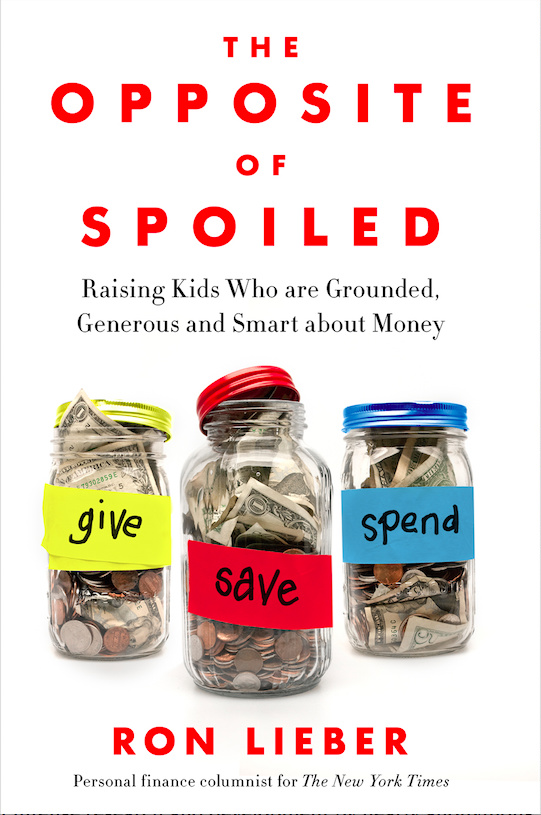The Opposite of Spoiled: A Review

How should we talk to our kids about money, and how soon? As author of the “Your Money” column in The New York Times and father of a school-age daughter, Ron Lieber is doubly qualified to take on this tricky subject. His book addresses the myriad money questions children raise, from “Can I have an allowance?” to “Can we buy that homeless man an apartment?”
The Opposite of Spoiled seeks to combat “the epidemic of silence around money” in many families, which Lieber attributes largely to our fear of raising spoiled children. He argues that this silence leaves young people unprepared for the realities of adult life. Worse, it lets us neglect what he views as a powerful tool to impart values “—from generosity and curiosity to patience and perseverance—[that] could be taught using money.”
To that end, he offers an action plan for parents, covering topics ranging from the economics of the tooth fairy, to charitable giving, to saving for college. He consults specialists and culls tips from families. A recurring theme is the importance of nurturing your children’s innate desire for a role in family decision making—and for responsibility. When I gave my 7-year-old her own cart in the supermarket last year, sending her off with half the shopping list, she thrilled at the chance to show competence, even coming back with extra savings. This is the classic Lieber kind of breakthrough moment for parents.
You’ll find plenty of advice in this book. Don’t tie allowance to chores. Don’t skip over TV ads. Don’t hesitate to give your child a $100 debit card on your weeklong trip to Disney; it will help her learn to judge priorities amid limited resources. Lieber admires the Smiths of Utah, a farm family whose sons help with every aspect of the family business. His trickle-up m.o. in this book is to gather lessons from such families and import them into wealthier, more leisured ones. He cites approvingly a Times colleague who makes his kids save to pay for their first semester of college; this “symbolic deprivation,” as Lieber calls it, reinstalls a sense of limitation into affluent lives and gives them “a bit of a reality reset.”
This book is not for everyone. Lieber candidly pegs his readership as those families with $75,000 of annual income or higher, noting that in doing so, he’s excluding three-quarters of American households (including, one should add, those in which deprivation is not symbolic but real). The Opposite of Spoiled is not a guide to changing inequality, but to raising kids within it—specifically, kids who are the winners within it. Is that enough? Lieber clearly has qualms about the more arrant displays of status that define our new Gilded Age. Take, for example, wealthy families who pay extra to cut the long lines at Disney. “[M]arching right by the other kids in a park that’s supposed to be full of amusements for all,” Lieber comments, “sends an awfully confusing message.” Actually, it sends a blunt message: We can. I wish Lieber would call this behavior out for the crass assertion of privilege that it is.
But parents looking for smart advice will find this book a resourceful guide. Lieber’s idea of fun can get a bit actuarial—like his excitement over offering a kid the choice between paying a 15 percent allowance tax or a 30 percent set-aside which you match, dollar for dollar, helping your kid practice for her 401k. He also seems like a great dad: smart, fair and funny (“It’s not like parents lack leverage; we control dessert, first and foremost”). His advice—have conversations, take an interest in your child’s point of view, tell the truth—is no less true for being familiar. Above all, Lieber understands that in any family, time is the most precious resource. Spend as much of it with your child as you can, and you will be truly rich.
Rand Richards Cooper ’80 is a film and book critic for Commonweal Magazine.